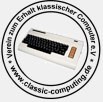Nachdem mein SB180FX jetzt wieder vollständig ist, bin ich auf Dateien gestoßen, die ein "Y" in der Dateiendung haben, z.B. Z180.HYP.
Kann mit jemand sagen, womit ich diese Dateien entpacken kann? Sie stammen aus einem LBR Archiv, falls das hilft.
UNCR sagt, "Not compressed" ![]()
"file" auf Linux sagt, sie seien "LZH compressed data".
Josef

